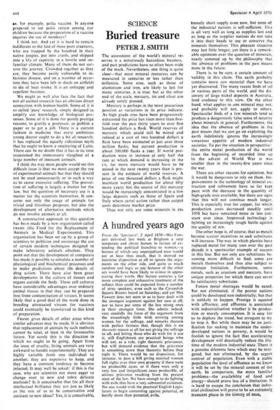SCIENCE
Buried treasure
PETER J. SMITH
The assessment of the world's mineral rei serves is a notoriously hazardous business, and past predictions have so.often been wide of the mark. Nevertheless, one thing is quite clear—that most mineral resources can be measured in centuries or less rather than millennia. Some ores, such as those of aluminium and iron, are likely to last for many centuries, it is true; but at the other end of the scale, mercury, tin and silver are already sorely pressed.
Mercury is perhaps in the most precarious position as variations in its price indicate. As high grade ores have been progressively exhausted the price has risen more than five-1 fold over the past thirty years to over five hundred dollars a flask. World reserves of mercury which could still be mined and refined at a cost of two hundred dollars a flask have been estimated at just over three million flasks; but current production is about 300,000 flasks a year. If world pro-, duction were to increase at only half the rate at which demand is increasing in the us, far more mercury would have to be mined in the next twenty years than is pre- sent in the estimate of world reserves. A price of one thousand dollars a flask might maintain world production for about fifty more years; but the source of this mercury would be increasingly concentrated in a few large deposits such as those of Spain and Italy where cartel action rather than output costs determine market price.
Thus not only are some minerals in exi tremely short supply even now, but none of the industrial nations is self-sufficient. This is all very well as long as supplies last and as long as the supplier nations do not take it into their heads to use or conserve the minerals themselves. This pleasant situation may last little longer; yet there is a remark, able optimism over the question of minerals, neatly summed up by the philosophy that the absence of problems in the past means none in the future.
There is, to be sure, a certain amount of validity in this claim. The earth probably contains more raw material than we have yet discovered. The many recent finds of oil in various parts of the world, and the dis- covery of large nickel deposits in Australia, lend credence to this view. On the other hand, what applies to one mineral may not, and probably will not, apply to others. Spectacular finds of a few minerals tend to produce a dangerously false sense of security about minerals in general. Furthermore, the idea that the absence of problems in the past means that we can go on exploiting the earth indefinitely ignores the increasingly voracious appetite of modern industrial societies. To put the situation in perspective: the entire metal production of the world from the beginning of recorded time up to the advent of World War It was smaller than in the twenty-five years since the war.
There are other reasons for optimism, but it would be dangerous to rely on them. Im- provements in the technology of mineral ex- traction and refinement have so far kept pace with the decrease in the quantity of high-grade ores available, but there are signs that this will not continue much longer. This is especially true for copper, for which production costs decreased steadily until 1958 but have remained more or less con- stant ever since. Improved technology is fighting an increasingly tough battle against the quality of ore.
The other hope is, of course, that as metals become scarcer incentives to seek substitutes will increase. The way in which plastics have replaced metal for many uses over the past decade is a spectacular example of success in this line. But not only are substitutes be- coming more difficult to find, some are metals themselves and thus also subject to ultimate limitation. Furthermore, some metals, such as uranium and mercury, have unique properties for which there can never be satisfactory substitutes.
Future metal shortages would be eased, but not eliminated, if the poorer nations could be developed non-industrially; but that is unlikely to happen. Prestige is equated with affluence, and affluence is associated with industrialisation whether it be product Lion or merely consumption. It is easy for us to deplore the trend, but arrogant to try to stop it. But while there may be no justi- fication for seeking to maintain the under. developed nations in poverty, it would be foolish to ignore the fact that accelerating development will drastically reduce the life- time of the modern industrial state. There is a genuine dilemma here which may be miti- gated, but not eliminated, by the urgent control of population. Even with a stable population the level of affluence as we know it will be set by the mineral content of the earth. In comparison, the more familiar problems—the availability of food and energy--should prove less of a limitation. It is hard to escape the conclusion that indus- trial civilisation will prove to be an extremely, transient phase in the history of man,


































 Previous page
Previous page